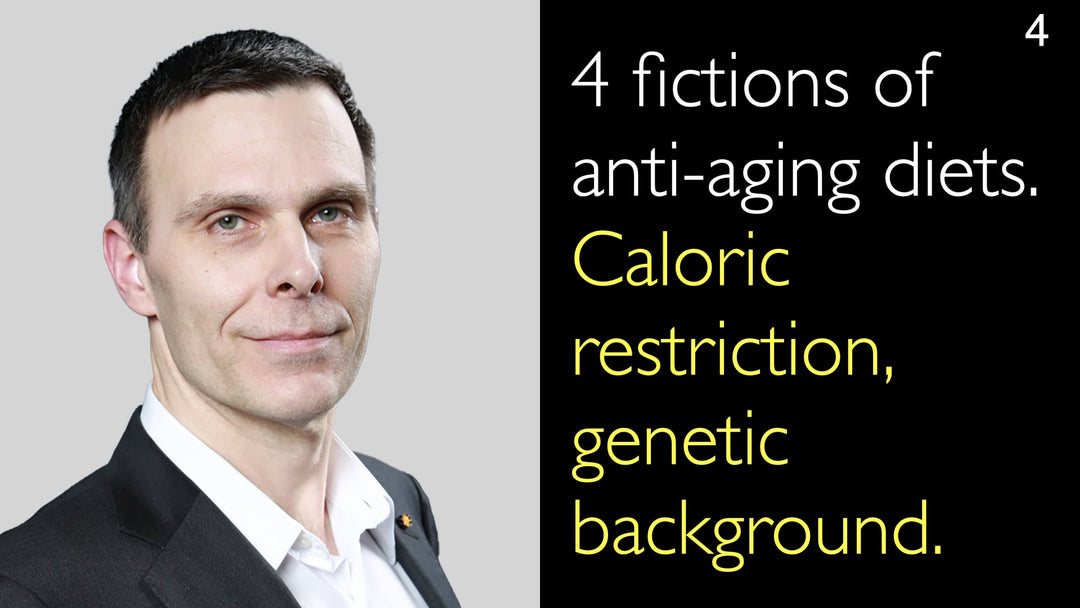Ведущий эксперт в области биологии старения, доктор медицины Мэтт Кеберлейн, разбирает четыре основных заблуждения о диетах, замедляющих старение. Он поясняет, что ограничение калорий не всегда продлевает жизнь. Генетический фон играет ключевую роль в том, как организм реагирует на изменения в питании. Результаты, полученные на инбредных лабораторных животных, часто нельзя напрямую экстраполировать на генетически разнородных людей. Доктор Кеберлейн подчеркивает важность персонализированного подхода и необходимость дальнейших исследований.
Разоблачение распространенных мифов о диетах против старения и ограничении калорий
Перейти к разделу
- Антивозрастные диеты не одинаковы
- Ограничение калорий не всегда эффективно
- Генетический фон влияет на реакцию на диету
- Результаты лабораторных исследований неприменимы напрямую к людям
- Необходимость персонализированного подхода в лечении
- Перспективы исследований в биологии старения
- Полная расшифровка
Антивозрастные диеты не одинаковы
Распространенное заблуждение в антивозрастном питании — представление о том, что все диеты работают одинаково. Доктор Мэтт Кеберлейн (MD) поясняет, что популярные подходы, такие как ограничение калорий, интервальное голодание и питание в ограниченное время, не взаимозаменяемы. Эти диеты могут влиять на процесс старения через разные биологические пути, и их эффективность может сильно варьироваться в зависимости от индивидуальных особенностей и условий применения.
Ограничение калорий не всегда эффективно
Ограничение калорий часто преподносится как универсальная стратегия продления жизни. Доктор Мэтт Кеберлейн (MD) называет это критическим заблуждением. Он указывает, что примерно у трети генетических линий модельных организмов ограничение калорий не дает преимуществ. В некоторых случаях сокращение калорий может даже сократить продолжительность жизни. Это показывает, что данный подход не является гарантированным решением против старения для всех.
Генетический фон влияет на реакцию на диету
Индивидуальный генетический профиль — ключевой фактор, определяющий реакцию на антивозрастную диету. Исследования на дрожжах, плодовых мушках и мышах выявляют значительные различия в результатах в зависимости от генетики. Доктор Мэтт Кеберлейн (MD) объясняет, что эта вариабельность означает: диета, полезная для одного человека, может быть нейтральной или вредной для другого. Эта сложность подчеркивает необходимость персонализированного питания для эффективных вмешательств против старения.
Результаты лабораторных исследований неприменимы напрямую к людям
Большинство данных об антивозрастных диетах получены в строго контролируемых лабораторных условиях на инбредных животных. Доктор Мэтт Кеберлейн (MD) предостерегает от прямого переноса этих результатов на людей. Люди обладают огромным генетическим и эпигенетическим разнообразием, которого нет в гомогенных лабораторных популяциях. Это разнообразие значительно затрудняет прогнозирование индивидуальной реакции на ограничение калорий или другие диетические вмешательства для долголетия.
Необходимость персонализированного подхода в лечении
Из-за отсутствия глубокого механистического понимания требуется персонализированный подход к антивозрастным диетам. Доктор Кеберлейн отмечает, что мы пока не можем предсказать, кому ограничение калорий принесет пользу. Без учета конкретного генетического фона человека рекомендация универсальной диеты потенциально рискованна. Будущее антивозрастного питания — в индивидуальных стратегиях, основанных на биологии конкретного человека.
Перспективы исследований в биологии старения
Необходимы масштабные исследования, чтобы перейти от ажиотажа к доказательной практике в антивозрастных диетах. Доктор Мэтт Кеберлейн (MD) подчеркивает важность понимания сложного взаимодействия между генами и диетой. Его работа, опубликованная в журнале Science, призывает к более строгим исследованиям в разнообразных популяциях. Цель — разработать надежные персонализированные диетические рекомендации для продления периода здоровья и долголетия.
Полная расшифровка
Доктор Антон Титов, MD: В беседе с доктором Антоном Титовым доктор Мэтт Кеберлейн, ведущий исследователь в области биологии старения, обсуждает основные заблуждения, или «мифы», связанные с антивозрастными диетами.
Доктор Мэтт Кеберлейн, MD: Основываясь на своем обзоре в журнале Science, доктор Кеберлейн подчеркивает необходимость критической оценки популярных предположений о диетических вмешательствах, таких как ограничение калорий, интервальное голодание и питание в ограниченное время.
Доктор Антон Титов, MD: Одно из самых распространенных заблуждений — что все антивозрастные диеты работают одинаково или взаимозаменяемы.
Доктор Мэтт Кеберлейн, MD: Идея о том, что все антивозрастные диеты одинаковы, не доказана. Разные диеты могут действовать через разные биологические пути, и их эффективность может сильно варьировать в зависимости от индивидуальных особенностей и контекста.
Доктор Антон Титов, MD: Другое распространенное заблуждение — что ограничение калорий всегда эффективно.
Доктор Мэтт Кеберлейн, MD: Хотя верно, что ограничение калорий увеличивало продолжительность жизни во многих лабораторных экспериментах — особенно у генетически идентичных животных — в генетически разнообразных популяциях картина сложнее. Исследования на дрожжах, плодовых мушках и мышах показали, что примерно у трети генетических линий нет пользы от ограничения калорий. В некоторых случаях оно может даже сократить продолжительность жизни.
Это показывает, что ограничение калорий не универсально полезно.
Доктор Антон Титов, MD: Большинство экспериментов по ограничению калорий проводятся на генетически однородных животных в строго контролируемых лабораторных условиях.
Доктор Мэтт Кеберлейн, MD: Это полезно для контроля вариаций, но можно упустить, что другой генетический фон может не дать тот же эффект. Люди, напротив, генетически и эпигенетически разнообразны. Эта вариабельность значительно усложняет прогнозирование реакции конкретного человека на антивозрастную диету.
Доктор Антон Титов, MD: Еще один миф — что ограничение калорий не несет рисков.
Доктор Мэтт Кеберлейн, MD: Хотя оно может предлагать преимущества определенным людям, для других оно может быть нейтральным или даже вредным. У нас практически нет механистического понимания взаимодействия между генотипом и реакцией на ограничение калорий. Это поднимает важный вопрос: без знания конкретного генетического или эпигенетического фона человека трудно предсказать, поможет ли ограничение калорий или навредит.
Персонализированная медицина еще не догнала сложность диетических вмешательств против старения.
Доктор Антон Титов, MD: Антивозрастные диеты не универсальны.
Доктор Мэтт Кеберлейн, MD: Хотя стратегии вроде ограничения калорий и питания в ограниченное время перспективны, их эффекты сильно варьируют среди разных генетических фонов. Они работают не всегда. Необходимы дополнительные исследования, чтобы понять сложное взаимодействие между генами и диетой в биологии старения и перейти от ажиотажа к доказательной практике.




